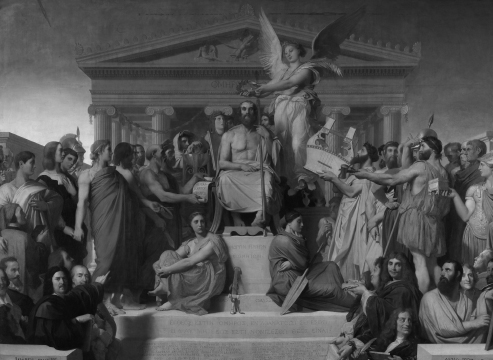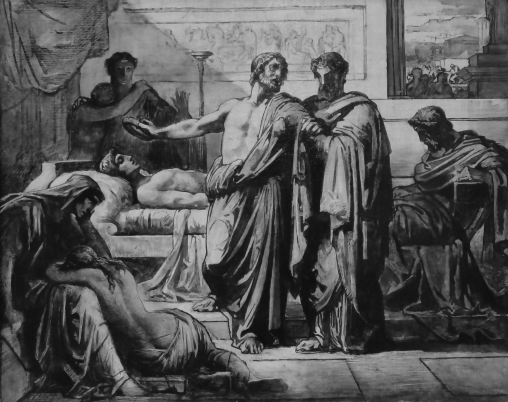Pericles of Athens (43 page)
Read Pericles of Athens Online
Authors: Janet Lloyd and Paul Cartledge Vincent Azoulay


FIGURE 14.
The Apotheosis of Homer
(1827), by Jean-Auguste-Dominique Ingres. Oil on canvas. Pericles is hardly visible,
a sign that he is less important than Homer and Phidias, who almost entirely hide
him. The tableau is imagined at the same moment as George Grote was preparing to put
the
stratēgos
back center-stage in the West. Paris, Musée du Louvre. © RMN-Grand Palais (Musée
du Louvre) / Thierry Le Mage.
Declaring his disdain for Sparta, which was reduced to “a mere war-machine,” this
French historian celebrated bourgeois Athens and its incomparable leader, with unprecedented
enthusiasm: “Never before, in Athens, had any man held such power … and never was
power acquired and preserved by such pure means. Pericles, with no particular title
and no special post of command and through the sole authority of his genius and virtues,
became the master of Athens, a post that he filled with more nobility than
Augustus in Rome.”
63
The idealization of Pericles now reached its peak, for Duruy even went so far as
to justify the city’s imperialistic policy: “Of all the regimes that were destroyed,
only one was to be regretted, that of Athens and Pericles. As long as it existed,
there were fewer instances of cruelty and injustice and greater glory and prosperity
than Greece had ever known.”
64

FIGURE 15.
Périclès au lit de mort de son fils
(1851), by François Nicolas Chifflart (1825–1901), Saint-Omer, Musée de l’Hôtel Sandelin,
inv. 975.001. © Musées de Saint-Omer, D. Adams.
However, this eulogy did not go so far as to celebrate the democratic system as such,
as, for the author, those Athenians all belonged to an elite group, “an aristocracy
raised by its taste, its elegance, its intellectual culture and its habit of command,
far above the ordinary condition of other peoples.”
65
So it was not the “ignoble populace” that governed the city, but an aristocracy of
15,000 citizens. From this point of view, Duruy’s argument was perfectly compatible
with the authoritarian regime that, in the very same year as that of the first edition
of his work, had been established by Louis-Napoléon Bonaparte.
This idealized representation of Periclean Athens did not triumph without encountering
a degree of resistance in French intellectual circles. The philologist Charles Nisard,
a devoted supporter of Sparta, produced an acerbic review of Duruy’s work, accusing
its author of devoting a “juvenile admiration” to Athens.
66
However, the situation evolved rapidly in the years that followed, when Duruy obtained
uncontested power in the educational world.
67
Having risen through every level of the educational system, he was in a position
to spread his ideas in textbooks such as his
Abrégé d’histoire grecque pour la classe de cinquième
(
Abridged history of Greece for fifth-year pupils
), which appeared in 1858 and ran into many further editions. Having become the general
inspector of secondary education (1862–1863) and subsequently the Minister for Public
Instruction (1863–1869), under the Second Empire, he found himself in an unchallengeable
position to impose his view of Greece throughout the colleges and secondary schools
of France.
The advent of the Third Republic put the finishing touches to this slow conversion
of attitudes. While Napoleon III remained fascinated by Julius Caesar—to whom he devoted
a biography in 1865—Gambetta regarded Periclean Athens as a model for the new Republican
regime. He explicitly referred to the analogy in the funeral speech he delivered on
24 May 1874, in the Montparnasse cemetery, at the tomb of Alton Shée: “If it has the
intelligence to rally to the new France, the France of work and science, [the nobility],
through proud patriotism and noble delicacy, will contribute to providing the French
republic with the flower of elegance and distinction that will make it, in the modern
world, into what the Athenian republic was in Antiquity.”
68
Modeling his speech on Pericles’ funeral oration,
Gambetta looked forward to the establishment of a moderate Republic that brought together
the work of the populace, the knowledge of scholars, and the elegance of aristocrats.
Pericles in the
Altertumswissenschaft
: The History of a Disenchantment
Beyond the Rhine, Pericles benefited from the popularity of Thucydides that was then
sweeping through Europe. The founders of
Altertumswissenschaft
, the “science of Antiquity,” shared a boundless admiration for the author of
The Peloponnesian War
. They included Barthold Georg Niebuhr, Leopold von Ranke, and Wilhelm Roscher—whom
Marx even went so far as to call Wilhelm
Thucydides
Roscher.
69
The author of
The Peloponnesian War
underwent a veritable historiographical apotheosis.
70
His history was regarded as an “extraordinary work”;
71
and Niebuhr even considered Thucydides to be “the most perfect historian among all
those that have ever written,”
72
while Ranke, for his part, confessed that Thucydides was the writer “before whom
he fell to his knees.”
73
This admiration was reflected in opinions of Pericles, as is clear from the
Griechische Geschichte
by Ernst Curtius (1814–1896), which appeared between 1857 and 1867.
74
Following in the neohumanist steps of Winckelmann, Curtius extolled Athenian prosperity
and launched into a “defence and illustration” of Pericles. Like Grote, he based his
eulogy on the rehabilitation of Thucydides, “the only man who makes it possible for
us to rediscover the original features of this image [that of Pericles] that has been
so disfigured.”
75
He claimed that the
stratēgos
, who was a statesman as well as a philosopher, exerted upon the people a “consistent
and firm government,” thereby creating a perfect “combination of democracy and monocracy.”
76
No major fault could be attributed to him, including where the members of the Delian
League were concerned: “as to the treatment of allies, the sagacity as well as the
sense of justice of Pericles led him to object to the imposition of any undue burdens
upon them, and to any measure tending to irritate their feelings.”
77
Even his private life was praiseworthy: Curtius found no fault with his love of Aspasia,
a woman who possessed “a lofty and richly endowed nature, with a perfect sense of
all that is beautiful.” According to Curtius, “the possession of this woman was in
many respects invaluable for Pericles. Not only were her accomplishments the delight
of the leisure hours which he allowed himself, and the recreation of his mind from
its cares, but she also kept him in intercourse with the daily life around him.” Better
still, he declared, she initiated him into Sicilian eloquence and “was of use to him
through her various connexions at home and abroad, as well as by the keen glance of
her sagacity and by her knowledge of men.”
78
All the same, Curtius had no admiration for Athenian democracy as such—which is hardly
surprising in the man who was the tutor of Frederick III, the heir to the throne of
Prussia. The reason he so admired Pericles was precisely because the Athenian leader
had removed all substance from the power of the people; under his leadership, “all
the principles of democracy were virtually abolished, viz the constant change and
the distribution of official power, and even the responsibility attaching to it and
forming the strongest guarantee of the sovereignty of the people. … Pericles, alone
invested with a continuous official authority which commanded all the various branches
of public life, stood in solitary grandeur firm and calm above the surging State.”
79
Curtius, who was both a liberal and a monarchist, thus constructed the image of an
Athens without democracy, the popular institutions of which were tempered or even
neutralized by an aristocracy of the virtue that was embodied by Pericles.
The vision defended by Curtius soon entered general circulation. His work was rapidly
translated into English and French and was certainly the Greek history that was most
widely read in the nineteenth century and that, in its turn, influenced a number of
great German historians. One was Wilhelm Adolf Schmidt, who described Pericles as
“the zenith of the entire ancient and classical world” and the cultural peak of human
history.
80
However, this idealized image soon faded away in the Germanic world. Two developments
combined to marginalize or even discredit Pericles in Germany. In the first place,
Athens was no longer alone in attracting the attention of historians, many of whom
now turned to Rome or to the history of the Hellenistic kingdoms; and second, the
progress made by the new “science of Antiquity” led to disenchantment with Pericles’
city, revealing hitherto unrecognized shortcomings.
81
Following the Napoleonic occupation, one of the priorities of the Prussian government
was to organize
Altertumswissenschaft
around subjects previously left aside in the Germanic world. Rome, for a long time
the preserve of the French, now attracted the attention of German scholars. After
Barthold Georg Niebuhr’s seminal study, published between 1811 and 1832, Theodor Mommsen
flung himself into composing his
Roman History
in eight volumes, publication of which was spread over more than thirty years, from
1854 to 1886. Now that Germany assumed as its objective the constitution of a national
state or even a unified empire, there could no longer be any question of ignoring
Roman history.
That same quest for unity steered Germanic historians toward the study of Alexander
the Great’s empire and the states that emerged from it. As early
as the 1830s, Johann Gustav Droysen paved the way for this new “Hellenistic” history.
In his
Hellenistic History
(
Geschichte des Hellenismus
), written between 1836 and 1843, this historian, who had sat in on the lectures given
by Hegel, exalted the political work of Philip II, praising him for having unified
all Macedonia into a homogeneous “nation” while, on the contrary, he had nothing but
scorn for the
Kleinstaaterei
, the political fragmentation of the Greek world.
82
In his
Alexander
, which appeared in 1833, he cast Pericles in a villainous role. Although he recognized
that his reign had marked the peak of Athens’s glory, he accused him of having handed
over all decisions to the people, “the people among which Pericles constantly encouraged
a taste for democratic ideologies.”
83
According to Droysen, that excessive liberty led to the establishment of a veritable
tyranny over the allies, which eventually rebounded against itself, propelling the
city into ruination.
84
Seen from this teleological point of view, in which a unified State constituted the
vanishing point, the figure of Pericles symbolized the Greek cities’ inability to
achieve political unity and put an end to their internal quarrels.
This rejection of Athens was further emphasized by the evolution of
Altertumswissenschaft
scholarship. As early as the start of the nineteenth century, Pericles had been a
target of criticism, breaking with Winckelmann’s kind of admiration. In 1817, Augustus
Böckh, in his scholarly treatise on
The Public Economy of Athens
(
Die Staatshaushaltung der Athener
), was declaring that “depravity and moral corruption were rife throughout the Athenian
community.”
85
And Pericles was certainly not excepted from this bitter observation. On the one
hand, Böckh recalled the various accusations of corruption leveled at him, reassessing
their credibility but not wholly rejecting them;
86
on the other, he criticized the
stratēgos
for his sumptuary expenditure on the people, even though, backed up by his sources,
he did recognize that Pericles never offered pay for attending the Assembly.
87
